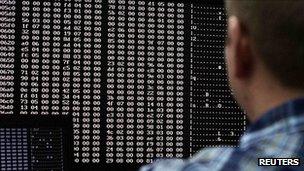Ministry of Defence joins firms to tackle cyber threat
- Published

Cyber-attacks are a near-daily threat to defence and security companies
The UK's defences against cyber attacks are to be strengthened under new plans that will see the Ministry of Defence working with its biggest contractors.
The MoD said the partnership could mean more intelligence is shared about the latest cyber threats.
Defence companies face cyber-attacks almost daily, often from countries seeking to steal sensitive information about new technology and weapons.
Officials say they hope the plan will serve as a model for other sectors.
The new Defence Cyber Protection Partnership - a joint effort between the UK government and nine large defence companies - is designed to improve the industry's collective defences against cyber-attacks.
It will also work to establish higher standards of security for smaller companies in the supply chain.
Cyber-attacks are one of the top four threats to UK national security alongside international terrorism, according to the government's National Security Strategy.
Earlier this month, UK intelligence service GCHQ said Britain was seeing about 70 sophisticated cyber-espionage operations a month against government or industry networks - some 15 of which were against the defence industry.
GCHQ director Sir Iain Lobban said business secrets were being stolen on an "industrial scale" and in some cases foreign hackers had penetrated firms for up to two years.
In 2010 the British government designated the protection of computer networks as one of the country's most important national security priorities.
It pledged £650m of new investment over the next four years to continue tackling the problem as part of its National Cyber Security Programme.
In March, the government launched the Cyber Security Information Sharing Partnership to help businesses and government share information on cyber threats, including a secure web portal to allow information to be shared in real-time.
- Published1 July 2013
- Published30 April 2013
- Published9 April 2013